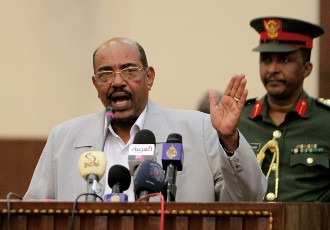Sudan’s Bashir to hold a press conference on Sunday expected to focus on economy
September 21, 2013 (KHARTOUM) – The Sudanese president Omer Hassan al-Bashir will hold a press conference on Sunday night that is expected to focus on the government’s long anticipated move to launch an economic package that will include the controversial decision to lift fuel subsidies.

Youssef said as a result the gallon of fuel will now sell for 21 Sudanese pounds ($2.69) which represents an increase of 10 pounds. He confirmed that gasoline and cooking gas prices will also go up as a result of subsidy cuts.
The VP acknowledged that the move will prove unpopular with the people but said that the government had no other options adding that as a result if savings from subsidies, salaries of government employees will see a minimum of 100 pounds increase and up to 600 depending on the job grade.
The issue of subsidies has sparked anger even among some of the ruling party officials forcing the government to go on the defensive about its necessity to prevent an economic collapse.
On Thursday, the Sudanese president and his finance minister Ali Mahmood Abdel-Rasool boasted that the Sudanese people were introduced to “Pizza”, “Hot dog”, and “Luxury housing” only after the 1989 coup which brought Bashir to power.
Bashir, who was addressing a crowed of the students affiliated with the ruling National Congress Party (NCP) on Thursday, said that he “challenges any Sudanese citizen who knew the Hot dog before the Ingaz (Salvation) regime,” asserting that his government will not back down from its decision to remove fuel subsidies.
The Sudanese president said that subsidies money should and would be directed to support poor families, retirees and students.
Bashir also reiterated the government’s justification for removing fuel subsidies saying that it only benefits the rich people while the low-income class continues to suffer.
“They [rich people] are riding the latest cars models and enjoying their air conditioning. They spend their vacations in Europe where they keep their money”, he said
On Saturday, the finance minister warned that inaction on these reforms means a regression to an economy of scarcity with long bread and fuel queues as it was in the past.
Abdel-Rasool pointed that even vehicles belonging to the United Nations and the U.S. charge d’affaires in Khartoum benefit from fuel subsidies adding that the purchases of fuel costs the government 24 billion pounds and 2.5 billion pounds for wheat.
He stressed that these amounts exceed an entire country’s budget and pointed out that the government buys at the market price of $146 dollars per barrel and sells it to refineries $49 which means losing $97 dollars per barrel.
NEW RECORD LOW FOR SUDANESE POUND
On the black market, the US dollar was now trading for 7.8 pounds on the black market – which has become the business benchmark – compared to 7.3 a week ago, black market dealers told Reuters.
This is the lowest rate since the launch of the currency in 2007. The central bank rate is around 4.4.
“People are trying to move savings into dollars as they expect much higher inflation and worse economic situation after the lifting of the fuel subsidies,” said a black market trader.
Sudan’s economy took a strong hit when oil-rich South Sudan became an independent state in July 2011 leaving the north suffering from dollar shortages, soaring budget deficit and high inflation.
Prior to the country’s breakup, Sudan produced close to 500,000 barrels but now its output is limited to 140,000 barrels per day. Oil revenue constituted more than half of the Sudan’s revenue and 90% of its exports.
The government in Khartoum is hoping that the fees collected from Juba for exporting its oil should cover part of the budget hole left by the country’s breakup but South Sudan oil production is still below optimal levels as a result of a year-long suspension.
(ST)
